Jesse R. Weinberg, Alon Berkman, Rebecca Meller
The special relationship between Jerusalem and Washington is a strategic asset for the State of Israel, especially in these times. Despite the aid transfers approved by Congress, the data shows that there is a significant decline in support for Israel among the ideological extremes of both parties. How should Israel act in the face of this emerging reality?
On April 23, the US Congress approved the foreign aid package presented by President Biden, amounting to $95 billion for Ukraine, Israel, and Taiwan. The vote reflected deep trends in the US Congress and among both parties regarding American foreign policy in general and the State of Israel in particular. The distribution of votes within both parties concerning aid to Israel and other issues included in the package, as well as according to ideological camps within both parties, is examined using data collected by the Data Analytics Desk at INSS. The data indicates that the majority of Congress members are still committed to Israel’s security, but there has been a significant decline in support from the ideological extremes of both parties. The analysis also points to a broad bipartisan consensus regarding the importance of the struggle against China, in addition to significant division regarding aid to Ukraine. Given this reality, Israel should develop a long-term foreign relations strategy that preserves its special relationship with the United States—even against the backdrop of the great power competition between the United States and China.
After a prolonged delay, on April 23, the US Congress approved the foreign aid package presented by President Biden, totaling $95 billion. The package includes aid for Ukraine, Israel, Taiwan, and humanitarian aid for the Gaza Strip. Additionally, the legislation encompasses other aspects related to US national security, including enforcing the sale of TikTok to an American company or a complete ban on the app due to concerns about espionage and influence operations by the Chinese Communist Party; expanded sanctions on Iran; and additional economic measures against Russia. The package first passed in the House of Representatives with separate votes on each of the four sections (Israel, Ukraine, Taiwan, and the House’s addition of the TikTok ban and sanctions against Russia), and then in an overall vote in the Senate, which passed by an overwhelming majority of 79–18. The package was approved against the backdrop of growing concerns about Ukraine’s situation on the battlefield and its handling of the Russian invasion.
Within the package, the section concerning Israel amounts to $26 billion, of which $9 billion is allocated for humanitarian aid in the Gaza Strip. Security assistance for Israel stands at $17 billion, of which $5 billion is earmarked for replenishing the inventory of Israel’s air defense systems—Iron Dome, David’s Sling, and the Arrow system, and it includes $1.2 billion for the development of “Light Shield.” Additionally, the US is investing $1 billion to increase the research and production of artillery and munitions in Israel, and $2.4 billion is dedicated to US operations in the Middle East under the US Central Command (CENTCOM). The assistance to Israel demonstrates the importance that the United States places on its relationship with Israel and its security, particularly following the Iranian attack on Israel on April 14.
The votes on the aid packages in both the House of Representatives and the Senate highlight important trends in the two parties concerning the US commitment to its allies in the context of the developments in the international and domestic arenas. The vote on the aid package for Israel, which included the humanitarian aid for Palestinians, passed in the House of Representatives by a large majority of 366–58 (among the opponents were 37 Democrats and 21 Republicans). The figures below present data collected by the Data Analytics Desk at INSS.
Figure 1. House of Representatives on the Aid Package for Israel by Party Affiliation
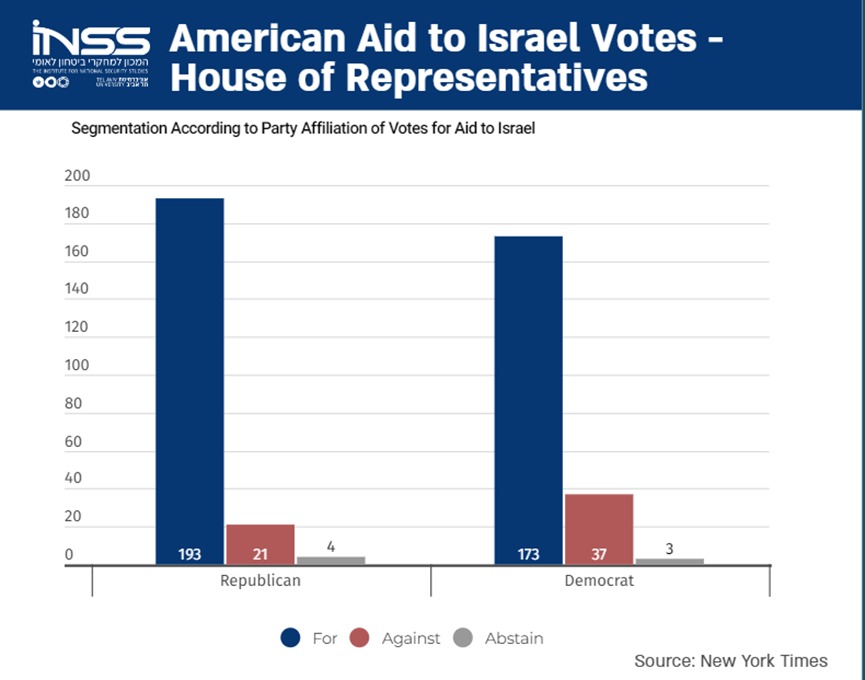
Note: Adapted from Catie Edmonson, Kayla Guo, Robert Jimison, Albert Sun, and Karen Yourish, “How the House Voted on Foreign Aid to Ukraine, Israel and Taiwan,” New York Times, April 20, 2024.
Figure 2. Senate Vote Results on the Comprehensive Aid Package by Party Affiliation
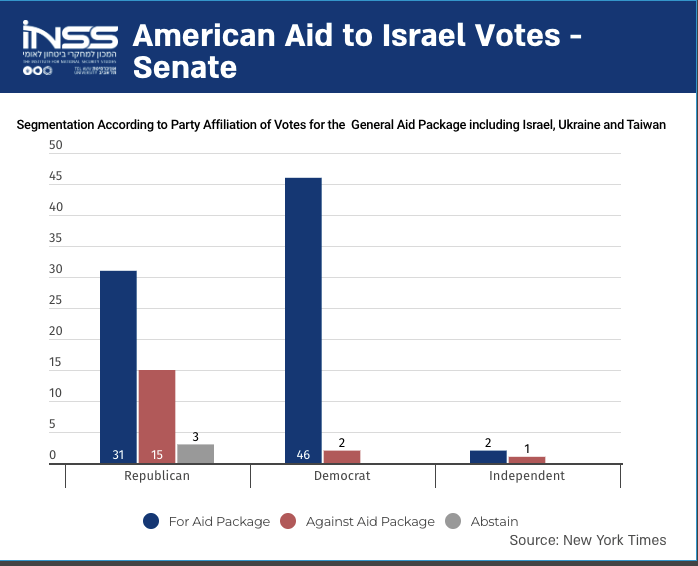
Note: Adapted from Catie Edmonson, Martin González Gómez, and Molly Cook Escobar, “How the Senate Voted on Foreign Aid to Ukraine, Israel and Taiwan,” New York Times, April 23, 2024.
Figure 3. Breakdown of the Vote on the Aid Package for Israel Among Republicans by Ideology
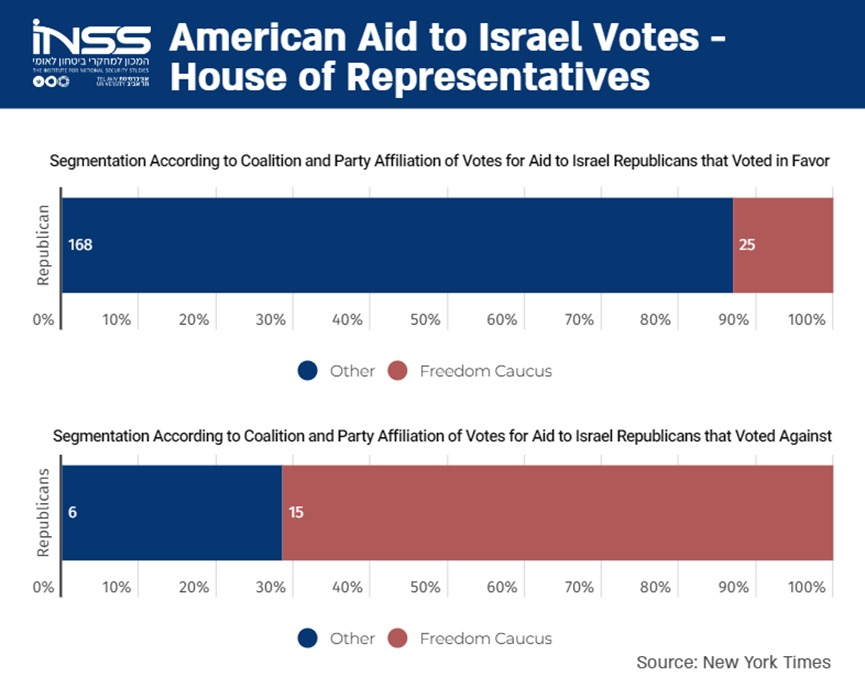
Note: Adapted from Catie Edmonson, Kayla Guo, Robert Jimison, Albert Sun, and Karen Yourish, “How the House Voted on Foreign Aid to Ukraine, Israel and Taiwan,” New York Times, April 20, 2024.
The opponents of aid to Israel mainly come from the two ideological extremes of the two parties: Ultra-conservative Republicans and progressive Democrats. About 36.5% of the lawmakers (15 out of 41, including one abstention) in the Freedom Caucus, the most conservative and anti-establishment caucus of the Republican Party, voted against the aid package to Israel. In comparison, 35.4% of the lawmakers (34 out of 96) in the Progressive Caucus of the Democratic Party, considered the leftmost wing of the party, voted against the package. It should be noted that the Progressive Caucus is not as ideologically homogeneous as the Republican Freedom Caucus and includes more moderate members of Congress.
The rationale of the two groups was fundamentally different—while many Republicans voted against the aid package due to concerns about its impact on the national deficit, progressive lawmakers opposed security aid to Israel on principle due to the humanitarian situation in the Gaza Strip and their increasing opposition to Israel.
Figure 4. Breakdown of the Vote on the Aid Package for Israel Among Democrats by Ideology
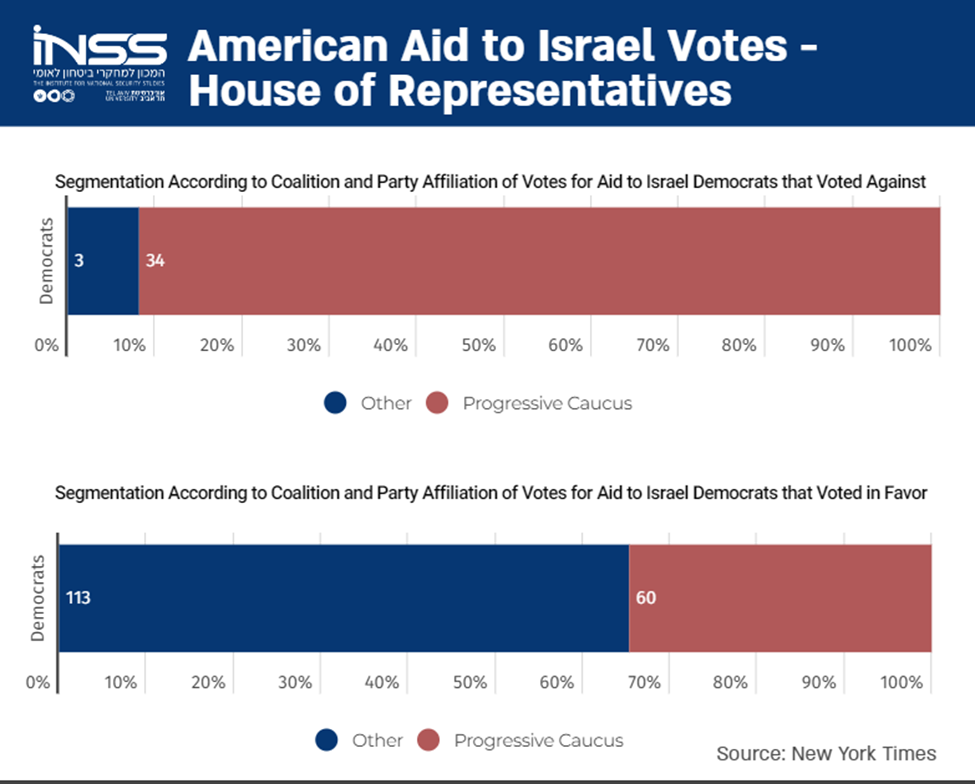
Note: Adapted from Catie Edmonson, Kayla Guo, Robert Jimison, Albert Sun, and Karen Yourish, “How the House Voted on Foreign Aid to Ukraine, Israel and Taiwan,” New York Times, April 20, 2024.
The votes in the House of Representatives indicate a growing trend of reservations among ultra-conservative Republicans regarding the funding of security assistance to US allies, particularly to Ukraine in its war against the Russian invasion. In fact, most Republicans in the House voted against the section of aid to Ukraine, and this legislation passed due to overwhelming support from the Democrats. At the same time, the majority of lawmakers from both parties supported the Taiwan section of the package, highlighting the bipartisan consensus on the need to address China as a top strategic challenge. The comparison between the parties’ votes on the different packages can be seen in Figure 5.
Figure 5. Vote Results on Aid Packages for Taiwan, Ukraine, and Israel by Party Affiliation
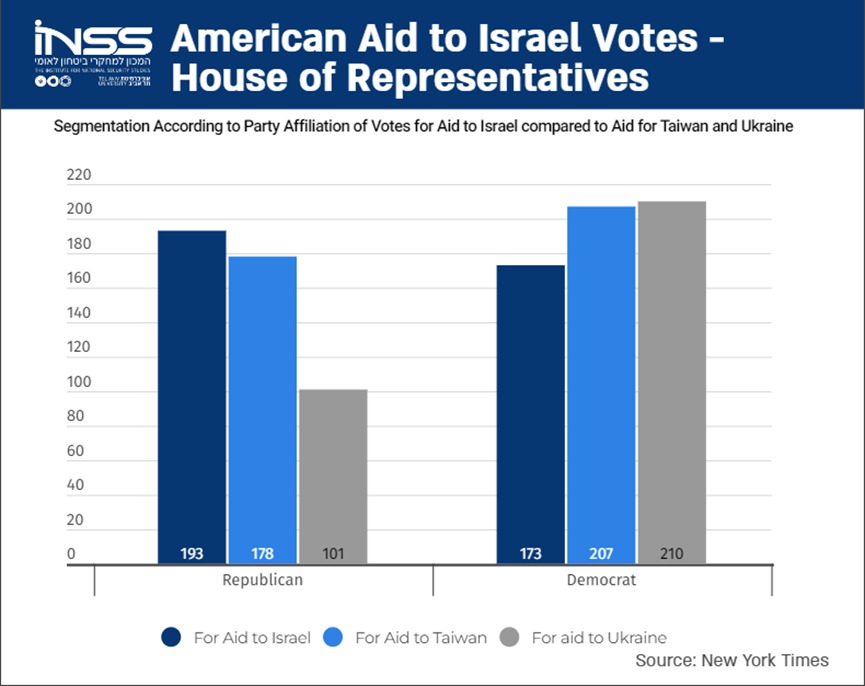
Note: Adapted from Catie Edmonson, Kayla Guo, Robert Jimison, Albert Sun, and Karen Yourish, “How the House Voted on Foreign Aid to Ukraine, Israel and Taiwan,” New York Times, April 20, 2024.
In a comparison of voting results in the House of Representatives and the Senate, three Democratic Senators—Peter Welch from Vermont, Jeff Merkley from Oregon, and Bernie Sanders from Vermont, an Independent who caucuses with the Democrats—considered to be among the most liberal senators, opposed the aid package due to the security aid to Israel. This stance reflects the changing attitudes of the progressive and younger voter base in the United States toward the Israeli–Palestinian conflict. Public opinion polls show that young Democrats are more likely to sympathize with Palestinians than with Israelis in the conflict, a significant shift compared to previous generations.
Regarding the Republicans, 18 opposed the comprehensive aid package primarily due to their reservations about the aid to Ukraine and the lack of addressing the issue of illegal immigration at the Mexican border, which has reached record levels in recent years. Several young senators considered rising stars in the Republican Party, including Josh Hawley and J. D. Vance, have long expressed principled opposition to aid for Ukraine, arguing that the United States should prioritize its internal affairs and the struggle against China over “adventures overseas.” These arguments can be seen as part of the Trumpian worldview’s takeover of the Republican Party (“America First”). Senate Republican Leader Mitch McConnell, who supports Ukraine, even admitted at a press conference that his party is captive to the demonization of Ukraine, which began with conservative media figure Tucker Carlson, who even interviewed Vladimir Putin exclusively in Moscow and portrayed him in a positive light. Indeed, the vote in the House of Representatives accurately reflects the prevailing views among the current Republican base.
Conclusion
The patterns emerging from the data emphasize the fact that Israel still enjoys broad bipartisan support in the United States. However, there are noticeable trends of concern among the ideological extremes of both parties, which have gained increasing public and media prominence in recent years. On the Democratic side, there is a significant decline in support for Israel among progressive voters and representatives, especially among the younger demographic. This phenomenon has received widespread coverage in the Israeli media, particularly given the protests on campuses across the United States in recent months.
A phenomenon deserving less attention but still worrisome is occurring within the right-wing populist camp, which has significantly expanded since Trump’s rise to power. Since the end of World War II, there has been a bipartisan political consensus in the United States that emphasizes American involvement in the international arena as a positive force, preserving peace, stability, prosperity, and free trade in the international system. However, in recent years, this bipartisan consensus has been challenged by prolonged wars in Iraq and Afghanistan, as well as the 2008 financial crisis, which shifted attention to America’s domestic issues. This trend began during President Barack Obama’s administration, which sought to reduce American involvement in the Middle East, particularly by withdrawing forces from Iraq. President Trump strengthened this trend, with a negative inclination toward traditional American allies and even open criticism of the global order, believing it works against American interests. This perception has gained traction within a significant portion of the Republican Party’s base and among conservative lawmakers in Congress, as evidenced by the vote on aid to Ukraine. While support for Israel remains mostly bipartisan at this time, there are significant questions about the future. Does the Republican Party see Israel as a central interest in an era where it prefers to focus on domestic issues?
The only issue that still has a clear bipartisan consensus in the field of foreign relations is the strategic threat posed by China, as reflected in the significant gap in voting in the House of Representatives on the latest aid package compared to previous ones. However, there are divisions and fierce debates between the parties, for example regarding the importance of the war in Ukraine as an integral part of confronting China and the anti-democratic/authoritarian axis in the world. Israel should closely monitor these trends within both parties and formulate a long-term strategy in the field of foreign relations. Israel needs to understand how it fits into the camp led by the United States in the face of confrontation with the authoritarian camp led by China, which also includes Russia and Iran. Above all, Israel needs to positively address American interests and government demands, both regarding the Gaza conflict and regarding the American push for a new order in the Middle East.







Share your opinion
The American Foreign Aid Package and Its Implications